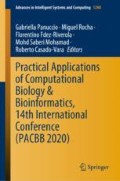Abstract
Anti-cancer peptides (ACPs) are a promising alternative to traditional chemotherapy. To aid wet-lab and clinical research, there is a growing interest in using machine learning techniques to help identify good ACP candidates computationally. In this paper, we describe DeepACPpred, a novel deep learning model composed of a hybrid CNN-RNN architecture for predicting ACPs. Using several gold-standard ACP datasets, we demonstrate that DeepACPpred is highly effective compared to state-of-the-art ACP prediction models.
Access this chapter
Tax calculation will be finalised at checkout
Purchases are for personal use only
References
Boopathi, V., Subramaniyam, S., Malik, A., Lee, G., Manavalan, B., Yang, D.C.: Macppred: a support vector machine-based meta-predictor for identification of anticancer peptides. Int. J. Molecular Sci. 20(8), 1964 (2019). https://doi.org/10.3390/ijms20081964. https://pubmed.ncbi.nlm.nih.gov/31013619, 31013619[pmid]
Chen, W., Ding, H., Feng, P., Lin, H., Chou, K.C.: iacp: a sequence-based tool for identifying anticancer peptides. Oncotarget 7(13), 16895–16909 (2016). https://www.ncbi.nlm.nih.gov/pubmed/26942877[pmid]
Coates, A., Abraham, S., Kaye, S., Sowerbutts, T., Frewin, C., Fox, R.,Tattersall, M.: On the receiving end — patient perception of the side-effects of cancer chemotherapy. Euro. J. Cancer Clinical Oncol. 19(2), 203–208 (1983).https://doi.org/10.1016/0277-5379(83)90418-2,http://www.sciencedirect.com/science/article/pii/0277537983904182
Gaspar, D., Veiga, A.S., Castanho, M.A.: From antimicrobial to anticancer peptides a review. Front. Microbiol. 4, 294 (2013). https://doi.org/10.3389/fmicb.2013.00294
Grisoni, F., Neuhaus, C.S., Gabernet, G., Muller, A.T., Hiss, J.A, Schneider, G.: Designing anticancer peptides by constructive machine learning. ChemMedChem, 13(13), 1300–1302 (2018). https://doi.org/10.1002/cmdc.201800204, https://onlinelibrary.wiley.com/doi/abs/10.1002/cmdc.201800204
Grisoni, F., Neuhaus, C.S., Hishinuma, M., Gabernet, G., Hiss, J.A., Kotera, M., Schneider, G.: De novo design of anticancer peptides by ensemble artificial neural networks. J. Molecular Model. 25(5), 112 (2019). https://doi.org/10.1007/s00894-019-4007-6
Harris, F., Dennison, S.R., Singh, J., Phoenix, D.A.: On the selectivity and efficacy of defense peptides with respect to cancer cells. Med. Res. Rev. 33(1), 190–234 (2013). https://doi.org/10.1002/med.20252
Hoskin, D.W., Ramamoorthy, A.: Studies on anticancer activities of antimicrobial peptides. Biochimica et Biophysica Acta (BBA) - Biomembranes 1778(2), 357 – 375 (2008). https://doi.org/10.1016/j.bbamem.2007.11.008
Ioffe, S., Szegedy, C.: Batch normalization: Accelerating deep network training by reducing internal covariate shift (2015)
Longley, D., Johnston, P.: Molecular mechanisms of drug resistance. J. Pathol. 205(2), 275–292 (2005). https://doi.org/10.1002/path.1706. https://onlinelibrary.wiley.com/doi/abs/10.1002/path.1706
Mahmud, M., Kaiser, M.S., Hussain, A., Vassanelli, S.: Applications of deep learning and reinforcement learning to biological data. IEEE Trans. Neural Netw. Learn. Syst. 29(6), 2063–2079 (2018)
Mahmud, M., Kaiser, M.S., Hussain, A.: Deep learning in mining biological data (2020)
Manavalan, B., Basith, S., Shin, T.H., Choi, S., Kim, M.O., Lee, G.: Mlacp: machine-learning-based prediction of anticancer peptides. Oncotarget 8(44), 77121–77136 (2017)
Meher, P.K., Sahu, T.K., Saini, V., Rao, A.R.: Predicting antimicrobialpeptides with improved accuracy by incorporating the compositional, physico-chemical and structural features into chou’s general pseaac. Scientific Reports 7(42362) (2017)
Mikolov, T., Sutskever, I., Chen, K., Corrado, G.S., Dean, J.: Distributed representations of words and phrases and their compositionality. In: Burges, C.J.C., Bottou, L., Welling, M., Ghahramani, Z., Weinberger, K.Q. (eds.) Advances in Neural Information Processing Systems, vol. 26, pp. 3111–3119. Curran Associates, Inc. (2013). http://papers.nips.cc/paper/5021-distributed-representations-of-words-and-phrases-and-their-compositionality.pdf
Tyagi, A., Kapoor, P., Kumar, R., Chaudhary, K., Gautam, A., Raghava, G.P.S.: In silico models for designing and discovering novel anticancer peptides. Sci. Rep. 3(2984), 2045–2322 (2013)
Tyagi, A., Kapoor, P., Kumar, R., Chaudhary, K., Gautam, A., Raghava, G.P.S.: In silico models for designing and discovering novel anticancer peptides. Sci. Rep. 3(1), 2984 (2013). https://doi.org/10.1038/srep02984
Wu, C., Gao, R., Zhang, Y., De Marinis, Y.: PTPD: predicting therapeutic peptides by deep learning and word2vec. BMC Bioinform. 20(1), 456 (2019). https://doi.org/10.1186/s12859-019-3006-z
Yi, H.C., You, Z.H., Zhou, X., Cheng, L., Li, X., Jiang, T.H., Chen, Z.H.: ACP-DL: a deep learning long short-term memory model to predict anticancerpeptides using high-efficiency feature representation. Molecular therapy. Nucleic acids 17, 1–9 (2019).https://doi.org/10.1016/j.omtn.2019.04.025,https://www.ncbi.nlm.nih.gov/pubmed/31173946, 31173946[pmid]
Author information
Authors and Affiliations
Corresponding author
Editor information
Editors and Affiliations
Rights and permissions
Copyright information
© 2021 The Editor(s) (if applicable) and The Author(s), under exclusive license to Springer Nature Switzerland AG
About this paper
Cite this paper
Lane, N., Kahanda, I. (2021). DeepACPpred: A Novel Hybrid CNN-RNN Architecture for Predicting Anti-Cancer Peptides. In: Panuccio, G., Rocha, M., Fdez-Riverola, F., Mohamad, M., Casado-Vara, R. (eds) Practical Applications of Computational Biology & Bioinformatics, 14th International Conference (PACBB 2020). PACBB 2020. Advances in Intelligent Systems and Computing, vol 1240. Springer, Cham. https://doi.org/10.1007/978-3-030-54568-0_7
Download citation
DOI: https://doi.org/10.1007/978-3-030-54568-0_7
Published:
Publisher Name: Springer, Cham
Print ISBN: 978-3-030-54567-3
Online ISBN: 978-3-030-54568-0
eBook Packages: Intelligent Technologies and RoboticsIntelligent Technologies and Robotics (R0)

